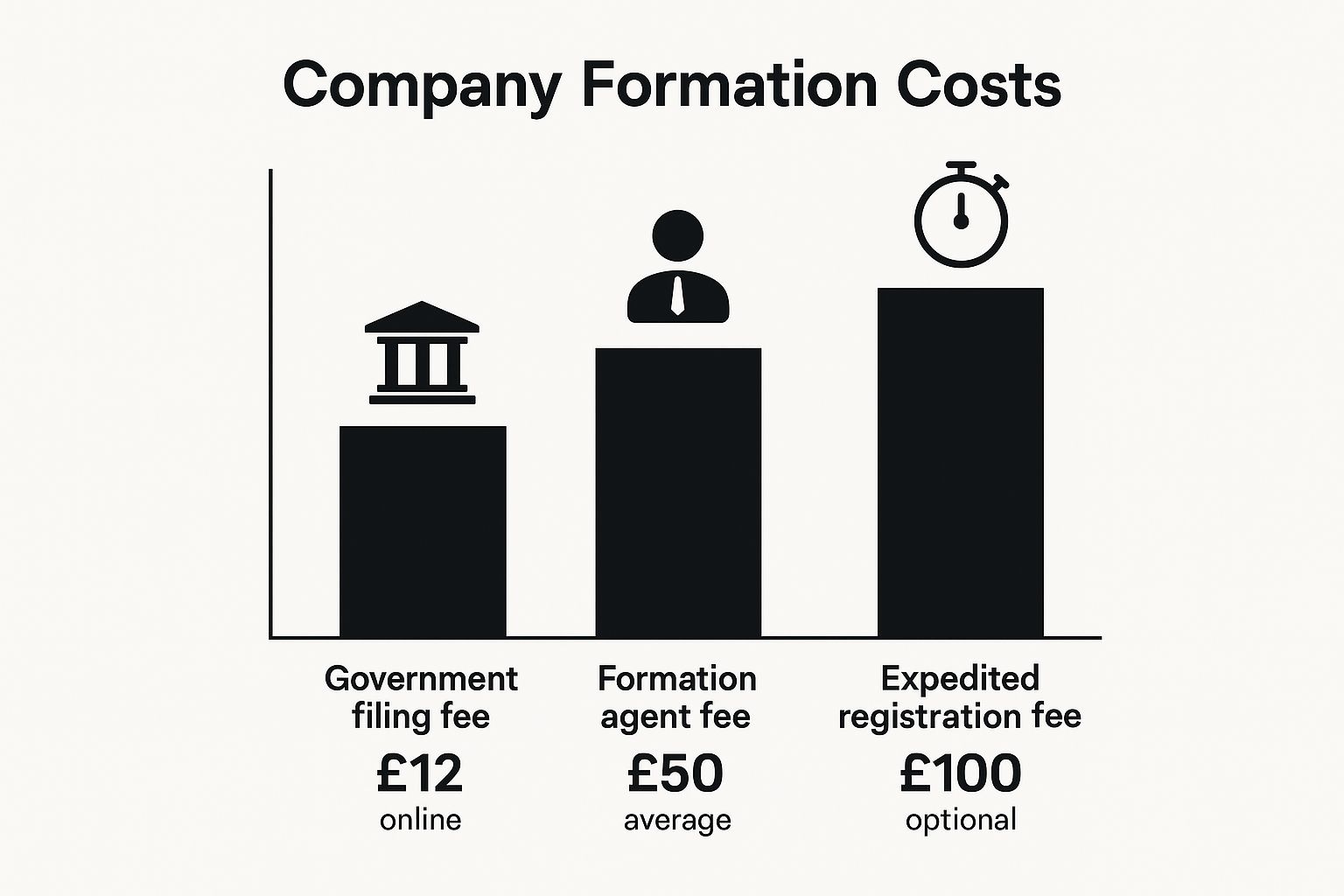
When you’re setting up a new business, the first question is often about cost. So, let’s get straight to the point: what are the official fees for registering a company in the UK?
The most basic, non-negotiable cost is the government fee you pay directly to Companies House. Think of it as the price of admission to get your new limited company officially on the books.
This fee saw a huge jump in May 2024. The standard online incorporation cost shot up from a modest £12 to £50—a hike of over 300%. It was one of the steepest increases in recent memory, catching many new founders by surprise.
Understanding this baseline fee is the first step. It's the financial foundation before you factor in any other startup costs. It’s also the moment many entrepreneurs decide to get some expert advice on the best way forward. Getting support from professionals who handle limited companies every day can ensure you start off on the right foot.
At a Glance: The fastest and cheapest way to register is online. Going the old-school paper route costs more and takes longer.
Here’s a simple breakdown of the direct fees you’ll pay to Companies House for the most common registration services.
Service
Filing Method
Fee
Company Incorporation
Online
£50
Company Incorporation
Paper
£71
Same-Day Incorporation
Online
£78
These are the core government charges. But as we'll see, they are just one piece of the puzzle when it comes to your total setup cost.
GenTax Accountants offers company registration services for just £30, including all Companies House fees. Begin your registration today!

If you were surprised by the recent jump in company registration fees, you’re not alone. This wasn't a simple tweak for inflation; it marks a major strategic shift for the UK's entire business environment.
The real reason for the hike is to arm Companies House with the resources it needs to take on powerful new responsibilities. Think of it as upgrading them from a simple librarian, just filing documents away, to a proactive security guard actively policing the UK’s business register. This whole transformation is driven by new laws designed to clamp down on fraud and dodgy dealings.
This change is a direct result of the Economic Crime and Corporate Transparency Act 2023 (ECCTA). This new law gives Companies House much more power to scrutinise company data, challenge suspicious information, and improve transparency across the board. To pay for all this, the fees for key services like setting up a new company were increased significantly in May 2024, a move detailed in recent guidance from the ICAEW about these new financial measures.
This extra revenue isn’t just for paperwork. It’s for building a much tougher system. The goal is to make the UK a far less attractive place for criminals trying to hide behind fake company structures.
The Big Picture: The higher fee you pay is a direct investment in protecting the integrity of the entire UK business ecosystem, making it a safer and more trustworthy place for legitimate entrepreneurs like you.
These new powers allow Companies House to:
In short, the increased company registration fees pay for the people and technology needed to build a more transparent and trustworthy corporate environment for everyone.
Once you’ve got your head around the official government fee, the next big question is how you’re actually going to register your company. There are essentially three routes you can take, and each one offers a different trade-off between cost, convenience, and expert support.
Picking the right path really comes down to your budget, your confidence in handling official paperwork, and how much of your own time you want to sink into admin.
Think of it like booking a holiday. You can go directly to the airline’s website yourself (the DIY approach), use a travel agent for a neat package deal (a formation agent), or hire a personal concierge to plan the entire trip (an accountant). Each one gets you to your destination—a fully registered company—but the experience and the final bill will look very different.
The image below gives you a quick snapshot of how the costs can build up.

As you can see, the basic company registration fees UK are just the starting block. Agent fees and other services are where the total cost starts to climb.
Let's break down the three main ways to get your company off the ground. The right choice depends entirely on your specific needs, so it’s worth understanding the pros and cons of each before you dive in.
Method
Typical Cost Range
Pros
Cons
Best For
Directly with Companies House (DIY)
£50 (online)
Cheapest possible option; you're in full control.
No support or error-checking; easy to make mistakes with legal terms.
Confident founders on a shoestring budget who understand the process.
Using a Company Formation Agent
£15 - £150+
Simple, streamlined process; application is checked for errors; often includes useful extras.
Costs more than DIY; quality and included extras vary wildly between agents.
First-time founders who want a hassle-free, quick, and affordable setup.
Engaging an Accountant
£100 - £500+
Expert advice on tax, share structure, and long-term compliance from day one.
Highest upfront cost; might be overkill for a very simple business.
Founders who want total peace of mind and strategic financial guidance from the start.
Each path has its place. The DIY route is for the brave and knowledgeable, the formation agent is for those who value speed and simplicity, and the accountant is for founders playing the long game who want to build on solid financial foundations.

The initial government fee to register your company is often just the tip of the iceberg. Many first-time business owners are surprised when the final bill for their company registration fees UK is higher than expected. This is usually down to a handful of optional, but often crucial, add-ons.
Think of it like buying a car. The sticker price gets you the basic model, but you'll almost certainly pay extra for essentials like floor mats, a decent sound system, or satnav. Company formation is much the same; extra services are available that provide vital privacy, compliance, and convenience.
These aren't just cynical upsells, either. Many are vital for protecting your personal information and making sure your business starts on a secure, professional footing.
When you're going through the registration process, especially with a formation agent, you'll likely be presented with a menu of extra services. Knowing what these are ahead of time helps you set a realistic budget and sidestep any last-minute surprises.
Here are the most common ones you’ll run into:
The key takeaway here is that these services solve real-world problems. Using a registered office address isn't a luxury; for many, it’s a non-negotiable step for maintaining a professional image and protecting personal privacy.
These expenses may increase your initial setup bill by £20 to over £100 annually. By being aware of these possible additional costs, you can make well-informed decisions to ensure your company is legally compliant and professionally presented from the start. Gentax can assist you with these services.
Getting your company registered is a great first step, but it’s a common mistake to think the spending stops there. The initial company registration fee is just the beginning; to keep your business healthy and on the right side of the law, you need to budget for ongoing costs.
These aren’t optional extras. They are mandatory, recurring fees required to keep your company in good standing. If you ignore them, you could face serious penalties, fines, or even see your company struck off the register entirely. That makes long-term budgeting just as critical as managing your initial setup costs.
Every single year, you must file a Confirmation Statement with Companies House. This isn't a financial report. Consider it more like a quick check-in to confirm that all the official details they have for your company, such as your directors, shareholders, and registered office address, are still correct.
This fee is part of a wider adjustment of government charges. As many accountancy experts have pointed out, Companies House is updating its fees to pay for new anti-fraud measures. This means the costs for key services are slowly creeping up. It's worth reading up on how these fee changes affect businesses so you can budget properly.
Your other major recurring task is filing your company's annual accounts. The cost for this can swing wildly, from absolutely nothing to thousands of pounds, all depending on how you choose to tackle it.
For a dormant company with no financial activity, you can file dormant accounts yourself at no cost. However, for an active trading company, both the complexity and the cost increase significantly.
Bringing an accountant on board to prepare and file your accounts will typically set you back anywhere from a few hundred to over a thousand pounds. The final bill depends on your company's size and how many transactions you have. While it's an expense, getting professional help ensures everything is accurate and compliant. Plus, a good accountant can often save you money in the long run through smart tax planning.

When you're dealing with official forms and company law, it’s completely normal for questions to bubble up. The costs tied to UK company registration can feel a bit tangled, but with clear answers, you can push forward with confidence.
This section gets straight to the point, tackling the most common queries we hear from founders. Let's clear up any lingering confusion you might have.
In short, no. You can't register a UK company for free. There’s a mandatory government fee that must be paid to Companies House for every single new incorporation. After recent changes, the absolute minimum you’ll pay for a standard digital registration is £50.
You might spot formation agents or banks advertising a 'free' registration. This usually means they swallow the government fee for you, but it’s almost always part of a package deal. Typically, you have to sign up for another paid service, like a business bank account. Always read the small print to see what you're really committing to.
The most cost-effective option is to have GenTax Accountants form it for you, costing just £30. Alternatively, you can do it yourself through the Companies House online portal, where you'll only pay the £50 statutory fee without additional charges from a third-party service. However, this DIY method places all the responsibility on you, requiring precision in every detail, and lacks the additional services such as a registered office address or document support that an accountant offers.
Key Insight:
Choosing GenTax accountants is more economical in this situation, as it helps avoid expensive mistakes and keeps your personal address confidential.
Legally, you are not required to use an accountant for your company registration. You're completely free to do it yourself or use a formation agent.
However, bringing an accountant into the fold from day one can be incredibly valuable, especially if your business has a more complex structure. An expert can give you crucial advice on share allocation, long-term tax planning, and your overall financial strategy. While it's a higher upfront cost, their guidance can prevent mistakes that could cost you much more down the line. If you're curious about this path, you can learn more about us and how we help new businesses start on solid ground.
Failing to file your annual confirmation statement on time has serious consequences. It's a criminal offence, and both the company and its directors can be prosecuted and fined. Even more critically, Companies House has the authority to remove the company from the official register. If that occurs, your company legally ceases to exist, and all its assets, including any money in the bank, can become the property of the Crown. Meeting this annual deadline is crucial for maintaining your company's good legal standing.